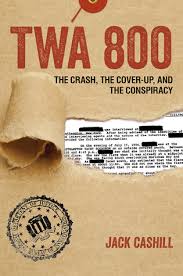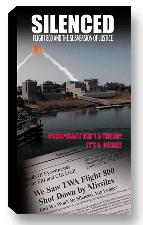Why the Media Never Called Tom Wolfe a “Conservative”
![]()

Order Jack Cashill's latest book, TWA 800: The Crash, the Cover-Up, and the Conspiracy
![]()

About Silenced: Flight 800
and the Subversion
of Justice (DVD) -
-Buy the Silenced DVD-
![]()
© Jack Cashill
May 16, 2018 - WND.com
On Monday, Tom Wolfe, the greatest conservative author of the last half century, died in New York City at 88 years of age.
Astonishingly, in memorializing Wolfe’s career, the media failed to point out that Tom Wolfe was a conservative, but a conservative Wolfe most certainly was.
Ten years ago, I finagled an invite to the fortieth birthday bash for the American Spectator for the simple reason that Wolfe was the keynote speaker.
During the Clinton years, the Spectator was the most feared and hated conservative publication in America. It was their reporting that led to Bill Clinton’s impeachment.
For Wolfe to speak at this event was to shed whatever cosmopolitan cover he had, but speak he did.
I do not remember exactly what Wolfe said, but it was something new, something surprising. As was his wont, he avoided the nitty-gritty of politics and explored the larger culture much as he had been doing for the past fifty years.
In his many books and essays, Wolfe usually took one of two tacks. The first was to skewer liberals and the pretensions. The second was to celebrate sectors of American life that otherwise went uncelebrated.
The skewering was always fun. His lengthy 1969 piece “Radical Chic: That Party at Lenny’s” immortalized composer Leonard Bernstein’s party for the Black Panthers at his opulent New York digs in all its glorious hypocrisy.
Wolfe published “Radical Chic” in book form as a companion piece to a deft hit on the everyday absurdities of liberal poverty programs titled, “Mau-Mauing the Flak Catchers.”
So dead-on was Wolfe’s reportage that the phrases “radical chic” and “mau-mauing” entered the lexicon and never left.
The first time I saw Wolfe speak was in Kansas City in the late 1970s. He had the effrontery to address a Midwest gathering of the Association of Art Critics on the subject of art criticism, a subject he had delightfully sliced and diced in his then recent book, “The Painted Word.”
The event was set up as something of a debate with Wolfe on one side and three professional critics on the other. If the organizers had thirty critics on the other side, it would not have helped their cause.
Although the attendees seemed initially hostile to Wolfe, he made his case so skillfully and congenially he won them over before the night was through. This was Wolfe’s perennial style, making converts, not enemies.
In the 1980s, Wolfe turned his attention to fiction and hit the mother lode with his first novel, the satirical “Bonfire of the Vanities.”
In his depiction of “the Reverend Bacon,” Wolfe foreshadowed the emergence of the Rev. Al Sharpton before anyone but New York news junkies had heard of him.
The book also anticipated the often fraudulent, PR-conscious narrative of just about every racial brouhaha that has followed the book’s publication.
Wolfe, however, did more than satirize. He celebrated. He had a profound appreciation of the country and its culture that came through even in his satires.
In this regard, two books come quickly to mind. The first is a 1965 collection of essays, “The Kandy-Kolored Tangerine-Flake Streamline Baby.”
Although the word had yet to come into play, Wolfe wandered among the “deplorables” and discovered everyday wonders that had theretofore gone undiscovered.
In the title essay, Wolfe explored the crazed and colorful lost world of Southern California car customizers.
In a separate essay in the same book and the most memorable, “The Last American Hero,” Wolfe told the forgotten tale of Junior Johnson and the birth of NASCAR.
Unlike Hunter Thompson and others, Wolfe never pretended to be like the people about whom he was writing—he wore his trademark white linen suit even among the Hell’s Angels—but he never condescended.
Arguably Wolfe’s best and most important book was “The Right Stuff.” Again, in telling the hair-raising tales of the nation’s test pilots turned astronauts, Wolfe rediscovered a glorious slice of Americana that most Americans had forgotten about if they ever knew it at all.
Although Wolfe made any number of influential enemies, he never lost the esteem of the literary establishment, right up until the end.
The reason why is fairly simple. Wolfe was so sophisticated, so clever, so cosmopolitan that liberals—in their unthinking vanity—assumed he had to be one of them.

